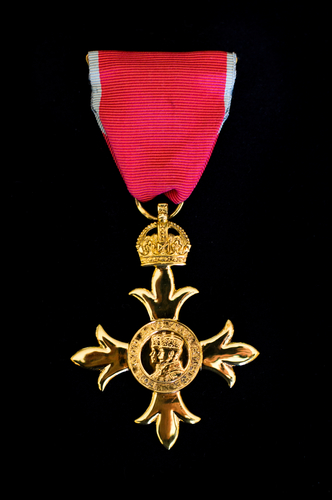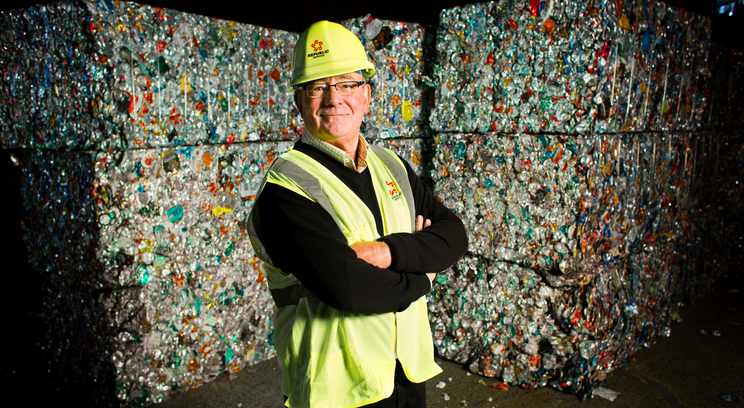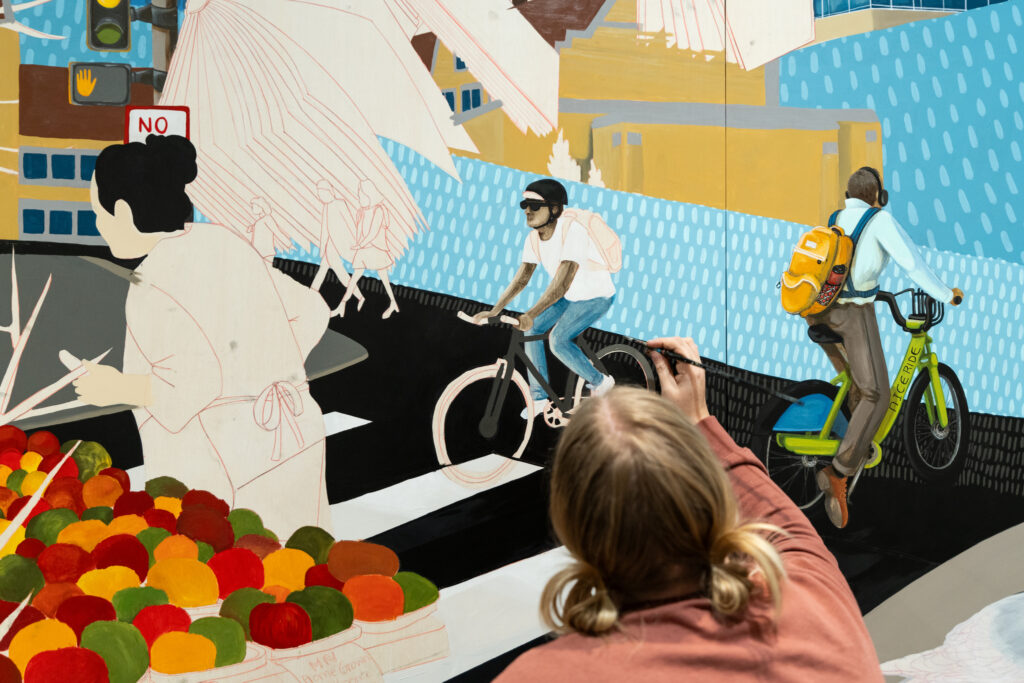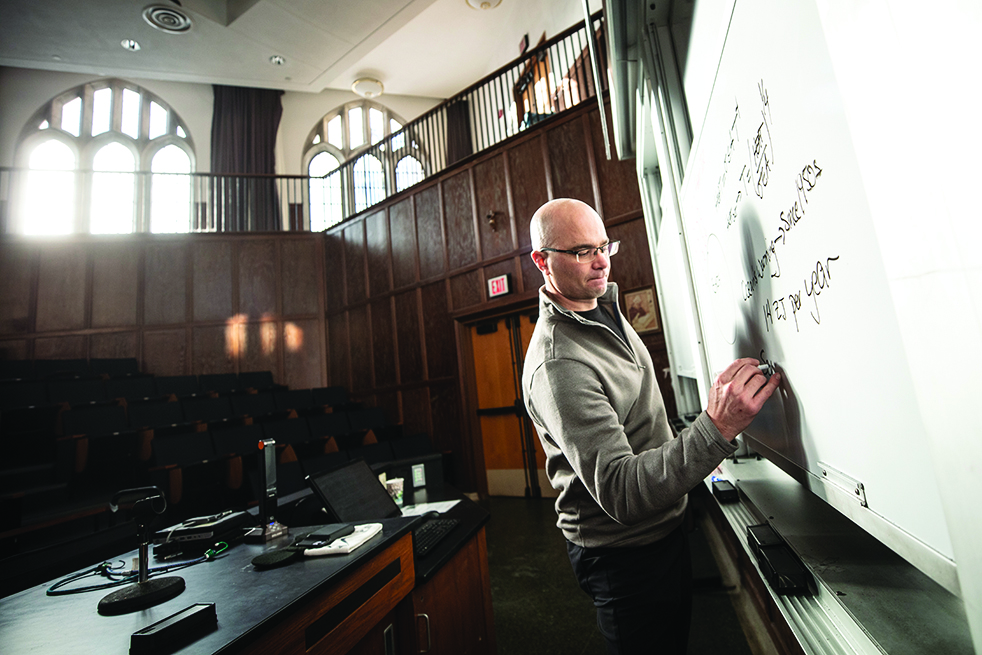In high school and college, David Dougherty says he “didn’t know who I was or what I was doing or where I was going.” After graduating from St. Thomas in 1965 with a political science degree, Dougherty did know one thing: He wanted adventure.
So he moved to Alaska.
“I picked Juneau thinking it was the largest city in the state since it was the capital. It wasn’t,” he said, laughing at his innocence. He didn’t know it then, but his misjudgment would prove inconsequential. His yet-to-be-lived career would fly him to the world’s most cosmopolitan cities.
As founder and executive director of the Clean Washington Center (1991 to 2006), an environmental technology center in Seattle, Dougherty brought his vision – to assist U.S. companies in processing and finding markets for recyclable materials − to manufacturers and governments around the globe.
In 2007, his work for the United Kingdom was honored by Her Majesty, the Queen of England, Elizabeth II, who bestowed on him the title “Honorary Officer of the Most Excellent Order of the British Empire.”
Dougherty said he doesn’t know who nominated him (the process is shrouded in secrecy) or why he, in particular, was selected, but he left a prolific trail of crumbs that may lead to the reason.
His story begins nearly 50 years ago in a tiny capital city on the panhandle of southeast Alaska.
“You can make a difference if you believe in something and you push for it”
Dougherty got his start at 22 in the office of Alaska Gov. William Allen Egan, the state’s first governor. (Alaska was a territory and did not officially become a state until 1959.) Egan tasked a small team that included Dougherty to secure national funding to get anti-poverty programs going for the rural villages inhabited by Eskimos and Alaska natives. Their effort was part of the national Great Society program, a plan created by President Lyndon B. Johnson to eliminate poverty and racial injustice in the United States.
“That was really transforming,” Dougherty said. “Even though I was a junior guy I realized what an impact I could make. … I realized, ‘Gee, I can make a change.’ And these were substantial changes we were making up there. Not only did we bring Head Start, we brought electricity to these villages and created co-ops for them.”
Dougherty also took part in educating Eskimos and Alaska natives on their rights to their lands − “lands that had never been ‘bought’ from them (when the United States purchased Alaska from Russia in 1867),” Dougherty explained.
“So there was a land claims bill submitted to Congress to pay them for their land, but it wasn’t going anywhere until oil was discovered (in 1968) on the North Slope (the northernmost section of Alaska),” he said. “A judge ruled that the oil companies couldn’t build a pipeline through Alaska to Valdez until they knew who owned the land. So the oil companies jumped in with the natives and got them to push a settlement to the land-claims groups. In the end, the Eskimos and Indians received a huge settlement from the federal government, which then helped them create a more economic base and growth.”
This first job, he emphasized, “made it clear to me that you can make a difference if you believe in something and you push for it.” After several years, Dougherty and his family moved to Anchorage, where he served as assistant city manager. There he led an initiative to consolidate the city of Anchorage and all of its emerging, outlying suburbs – which had their own local governments – into one unified government. It had to go to vote, and it passed.
“I think Alaska was a good thing for me because it’s so sparsely populated that one young guy in his early 20s could make an impact,” he said.
Even so, after getting married and having two children in Alaska, Dougherty began to feel confined and isolated and wanted his kids to grow up in a bigger city with more opportunities.
Seattle and Tougher Challenges
After relocating to Seattle with his family, Dougherty took on “bigger” and “tougher” challenges as assistant director of the state’s Department of Trade and Economic Development.
Gov. Booth Gardner tasked Dougherty with helping smaller businesses get more financing, for which he created two programs − one in which the state of Washington allowed small business to make public stock offerings, an option available only to big business at the time. The other would create an economic development finance authority that would “sell nonrecourse bonds to help small business and economic expansion in the state,” Dougherty explained.
While hearing Dougherty’s testimony before the state legislative committee on behalf of his proposals (both of which passed after much effort), Maria Cantwell, the committee chair and now a U.S. senator (D-WA), played an inadvertent role in charting the course of his career.
She asked him to conduct a yearlong study to devise a plan for reducing Seattle’s ballooning collection of recyclables – a pile so massive the Wall Street Journal dubbed it “Mount Glassmore.”
Dougherty remembers how Cantwell broached the subject: “She said, ‘You know, the cities are collecting papers and plastics and glass. Where are the markets for those?’”
The question threw him for a loop. Dougherty responded with a laugh, “I don’t do garbage!”
One thing he did know: Seattle had started recycling plastic, paper, glass and aluminum, and they were piling up. He also knew the city was paying $20 per ton to ship the papers “to somewhere in Asia to do something with them,” he said.
After completing their study, Dougherty and his team “came to the conclusion that if you didn’t get the industry in your own region to figure out how to process that material and put it back into your own products then recycling wasn’t going to work. Because nobody wanted glass. Plastic companies certainly didn’t want plastic. And the paper industry could only take certain grades of paper.”
The study brought to light a number of conundrums. Dougherty asked himself: “What are the engineered properties (of the recyclable materials)? How do you process this stuff in an economical way so they can be put back into product?”
His answer to these challenging questions was the Clean Washington Center, which he created in 1991. The organization, an effective blend of industry experts and government officials, worked to create markets for recyclable material. Its offshoots continue its mission today.
The CWC was so successful that it soon received $4 million from the federal government to make its work available to other states.
Among its successes were developing markets for recyclables that resulted in an average of about $100 a year per household in avoided waste removal costs.
In 2001, Dougherty told online magazine Recycling Today, “This region has always had the capacity for paper, but we have also developed the capacity for plastics, too. Five years ago we had no capacity to use recycled plastics – mainly PET and HDPE. Now it is a different story. Our engineers went to plastic plants and helped them convert to recycled feedstock. The result is that now we have an annual capacity of 12 million pounds of PET and HDPE. … so that has worked really well.”
After helping several states develop similar programs, the CWC’s trail of success stories caught the attention of New Zealand. Hong Kong, Spain, Australia and Scotland followed suit.
That’s a WRAP
Dougherty remembers the fraught phone call he received from the United Kingdom in 2000: “I was up in Scotland helping them develop a program (Remade Scotland) when I got a call from a spokesman for the environment minister from the U.K. saying, ‘We are so far behind in recycling. … The European Union has set down regulations and if we don’t meet certain levels of recycling we get financial fines. Could you set up a center for all of the U.K., including Northern Ireland?’”
The challenge he was up against was huge. And tough.

David Dougherty's Officer of the Most Excellent Order of the British Empire medal. (Photo by Mark Brown)
Using the CWC as a template and £84 million from the British government, Dougherty acted as a special adviser to shape the work programs and strategy that culminated in WRAP (Waste and Resources Management Programme). Among his collaborators was WRAP founding chairman Vic Cocker CBE (Commander of the Order of the British Empire, a rank one notch above “Officer”), brother of rock musician Joe Cocker.
Liz Goodwin, CEO of WRAP, who worked with Dougherty in the organization’s infancy, attested, “There were a lot of market failures that needed to be addressed. Some of the issues were lack of awareness, lack of infrastructure to make it easy for people, lack of reprocessing – both technology and infrastructure – lack of end markets, lack of confidence in end markets and lack of standards.”
When WRAP first began, Goodwin said, “household recycling rates (in the U.K.) were around 10 percent compared to 43 percent today. We were just starting on the journey to increase recycling. ... There hadn’t been any real focus on end markets or developing markets for the materials that were collected. There was very little infrastructure.”
WRAP was, and continues to be, a success. Its achievements include helping the U.K. recycling and reprocessing sector to quadruple in size between 2000 and 2008, diverting 670,000 tons of food from landfills, decreasing growth in household packaging waste and developing a “world-first technology for the closed-loop recycling of plastic bottles, which has led to the creation of a new market for recycled plastics in the U.K.,” according to its website.
Dougherty’s work on WRAP did not go unnoticed.
He remembered, “I got a call at 5 a.m. from the British Embassy. He informed me ‘You have been to the U.K. a lot.’ And I thought ‘Uh oh, I’m going to need a working visa. This is not good.’”
But the man continued: “‘ … your significant contributions to the United Kingdom and other countries have been noticed, and noticed at the highest level. This culminates six months of research on you, and I’m calling to tell you Her Majesty wishes to bestow one of the highest titles on you for your contributions to the world.’”
The honor is not given liberally. Notably, that year Bono was named an honorary Knight Commander of the OBE. Few Americans have received the title. Gen. George S. Patton and Bob Hope are among the Americans honored with the title “Officer.”
A Reluctant Tree Hugger
Thinking restrospectively on his career, Dougherty said, “To be honest, I was more attracted to the prospect of making recycling work than answering a calling to be an environmentalist. My wife is more of an environmentalist than I am.”
But when you spend a couple hours with him, it becomes clear he harbors an inner tree hugger.
“I’ve never seen this as a waste issue. It was always a materials efficiency issue,” Dougherty said. “Once you take down a natural resource, how do you use it many, many times before you eventually have to discard it? As the population continues to expand, these resources are going to get scarce.”
When he reminisces about how far recycling has come in the United States and his small part in its progress, his eyes light up: “When we started recycling it was just glass, paper and aluminum. And then we expanded to plastic. With paper in the beginning they could only take certain grades of fiber, but now they can take all grades. That’s a true example of recycling. We used to cut a tree down to make the Sunday paper and it had a 20-minute life span before you threw it away. Now that same fiber gets used seven or eight times before it gets thrown away.”
In addition to his work with governments, Dougherty has innovated technologies for recycling discarded material into usable, marketable products for corporate clients. He worked with Adidas, turning shoe scraps – canvas, plastic, leather – into artificial turf and other products. In a collaboration with the Miami Heat, he worked with engineers to turn tire rubber and shoe scrap into better cushioning for the team’s practice court. He also helped facilitate the invention of rubberized asphalt from ground-up car tires,
an innovation that is laid on California roads by law and has been implemented in several other states.
“You’ve got to use those resources because this planet is going to have a lot more people and it has got be able to stretch its resources. To me it was always an issue of using our natural resources more intelligently,” the environmentalist in him said. Retired for a few years now, Dougherty found a new challenge: working with Seattle Historic Parks. As a board member, he is leading an initiative to create a conservatory for each of the budget-tight city’s 18 deteriorating historic parks.
In his long and decorated career, Dougherty traveled a path that took him around the world and transformed him into many things: executive, government worker, officer, problem solver, believer, even, arguably, environmentalist.
But when reflecting on the whole of his career, Dougherty’s choice of words evoke the spirit of a 22-year-old adventurer who once made his way from Minnesota to Alaska in 1965: “I didn’t plan this. I just followed the road.”
Read more from St. Thomas Magazine.


